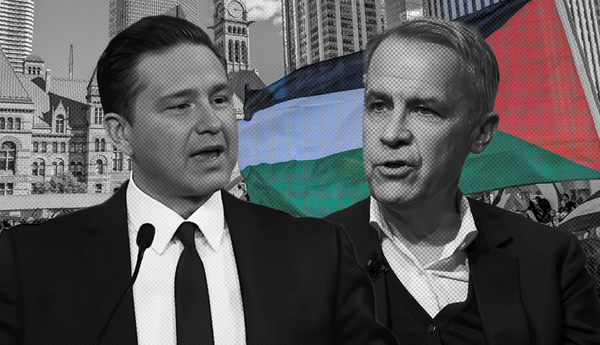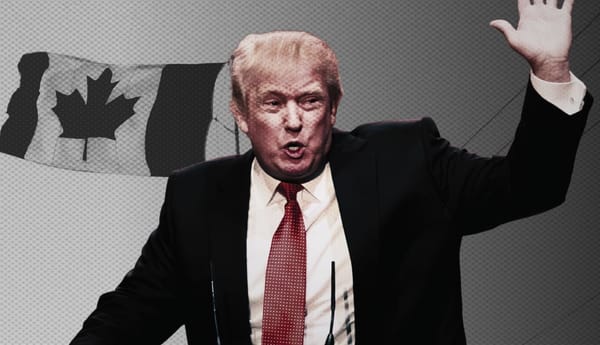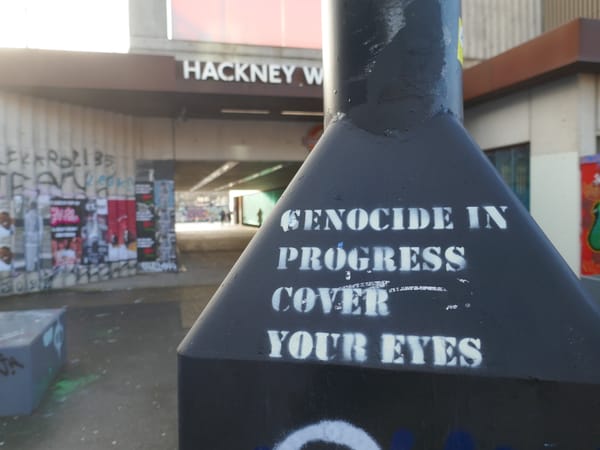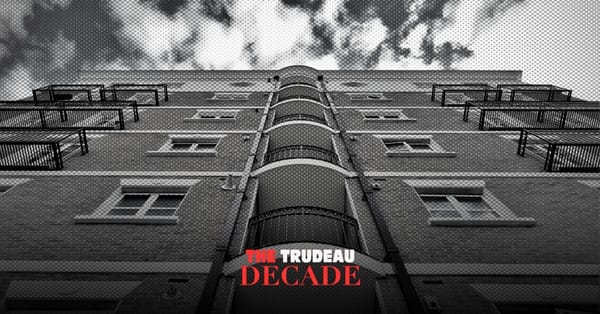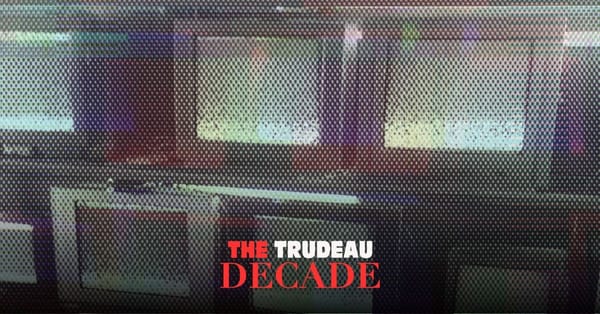On Nov. 10, 2023, a month into Israel’s ongoing genocide in Gaza, Canadians awoke to news that the entrance of an Indigo store in downtown Toronto had been splattered with washable red paint and plastered with posters decrying the corporation’s CEO’s support for former members of the Israeli military.
A few days later, I was arrested in a parking lot, bombarded by three officers and later interacting with five more before they figured out who would bring me into the police station. They seized my car, informed me that my house was about to be searched with my partner and children at home, and proceeded to detain me for almost 10 hours. Police took photos of our bedrooms and bathrooms, and seized almost every device in my home. A week later, 10 others were arrested in pre-dawn raids, in which police broke down doors and arrested people in front of their children. We would go on to be referred to as the ‘Indigo 11.’
We were charged with mischief and conspiracy, and police claimed our alleged actions were “hate-motivated.” A week later, as Jewish peace activists protested in front of the same store, the police added criminal harassment charges.
The media smeared the protest as antisemitic despite long-known facts about Indigo’s CEO, Heather Reisman. As of April 2024, Reisman and her billionaire husband, Gerald Schwartz, owned more than 60 per cent of the company’s shares. Reisman and Schwartz are also the co-founders of the HESEG Foundation, a charity that offers scholarships to so-called ‘lone soldiers’ — who travel to Israel from abroad to serve in its military — once they finish their service. The couple has donated more than $191 million since 2005 to the charity. Reisman has faced boycotts, scrutiny and protests for more than 15 years because of this.
There have been many developments in our cases since the initial arrests. The Crown dropped charges entirely against four of the accused. Late last year, the Crown also withdrew the criminal harassment charge against the rest. Five of the remaining accused continue to fight their charges in court. One other person and I, meanwhile, pleaded guilty to mischief.
On January 8, the two of us were given absolute discharges. I believe this sentencing affirms what should have been obvious to anyone who cared to look at the facts: this wasn’t a hate crime.
At the sentencing hearing, the judge referenced our lifetime of humanitarian and civil service, and noted we were amply punished by the arrests and the media smears we endured for months. The judge said, “It is clear you try to make the world a better place. In my view, any reasonable member of the public fully apprised of the circumstances of this offence and your personal circumstances, would come to appreciate that you did not get away easy. You have had criminal charges hanging over your head for over a year, which led to great disruption to your professional and personal lives, not to mention the unfavourable media attention you had to endure, and the execution of search warrants. You have contributed to communities far and wide in the past, and continue to do so today.”
As many have insisted, the Crown should have dropped all the charges long ago. This case has been a huge waste of public resources. More importantly, protesting amidst a genocide is a right in a liberal democracy. Everyone facing charges for doing so should have their charges dropped. And police and media should exercise more caution before portraying these acts as “hate crimes.” On the contrary, protesting amidst a genocide is an act of love.
Why I Did It
I’ve spent my entire adult life learning about and fighting against the oppression of human beings.
In my 20s, I worked on human rights issues in Myanmar. I lived in a refugee camp on the Thailand-Myanmar border for a couple of years and experienced how families survive in the shadow of war and oppression. When the genocide of the Rohingya people began, I witnessed how political leaders maligned and degraded them prior to killing them, how violence escalated to mass slaughter, and how society silently accepted or even excused what was happening.
I’ve also closely followed the plight and resistance of Palestinians. In 2023, I watched with growing dread as the rhetoric and actions from Israeli Prime Minister Benjamin Netanyahu’s government became increasingly destructive. Indeed, 2023 was the deadliest year for Palestinians in the West Bank, even prior to October 7. Like millions of others, I tuned in to Palestinian journalists on the ground, and watched horrendous attacks unfold on a daily basis. I practiced “with-nessing,” the act of being with Gazans as they live and die in these times. And as I did so, I noticed direct parallels between Gaza and Myanmar.
When it came to the Rohingya people, Canada took their displacement and oppression seriously, sent them aid and a special envoy, and, most of all, affirmed that what was happening to them was real. Canada has done almost none of this for Palestinians. Instead, our political leaders have lied to us, perpetuating propaganda about Israel’s supposed right to self-defence that portrays Palestinians as terrorists. Even worse, they’ve attempted to separate us from our own humanity. As we actively witness what’s happening to Palestinian families, the instinct to grieve and cry out, “Enough!” is met by silence, suppression, and denial.
From the very start, I knew it would be a genocide. I knew nearly half of the population of Gaza was made up of babies and children, and my body and soul became an open wound. My heart is shattered. I hold my children every day, bathe them, press food into their mouths, answer their curious questions, experience all the silliness and joy that children bring to the world … all while witnessing what parents in Gaza are dealing with. It’s an indescribable experience, one no other generation of parents has had in quite the same way. And it’s one that should ultimately remind us we have shared humanity and are responsible for one another, and that protest against genocide is, and always will be, a moral imperative.
The Indigo protest was just one of dozens of actions I took over the course of a year, between petitions, calls and emails to MPs, attending rallies, teaching, and learning. I understood the Indigo postering as a satirical art stunt alongside many others meant to bring attention to Canadian complicity in the violence in Gaza.
Boycotting has been one of the few tools regular citizens have to protest Israeli policies. Consumers deserve to know where their dollars may go, and we need to call out when profits may be being used to harm others. But the response to the Indigo protest has made evident that regular people are going to face criminalization when we go outside the inadequate forms of protest deemed to be ‘acceptable.’
The Struggle Continues
More than 100 people in the Greater Toronto Area are currently facing criminal charges for allegedly participating in protests against the starvation, displacement, slaughter, rape, kidnapping, mass killing of children and other violences Israel is committing against Palestinians. A great deal of those charged are young, renters, students and/or precariously employed, and some have family in Gaza.
Many of the charges they’re facing are forms of mischief, but some have also been wrongly charged with assaulting police officers. Take the case of Adam Melanson, for example. In December 2023, he was charged with assaulting a police officer — after an officer kneeled on his neck while arresting him. Last month, the charges against him were dropped. In another case, several arrestees were hospitalized by police, but they still were charged with a variety of offences, including assaulting officers. People continue to be arrested, and we know there are political influences pushing for harsher sentences for these activists.
Indigo has also used the court system against those seeking to bring attention to its CEO’s support of former Israeli military members. This happened in the litigation against a campaign urging consumers to boycott the book chain, as Indigo was able to win an order forcing all major Internet Service Providers to block its website. Facing the corporation’s huge resources for litigation, and perhaps not wanting their identities to become known, the activists didn’t even bother to contest Indigo’s motion in court.
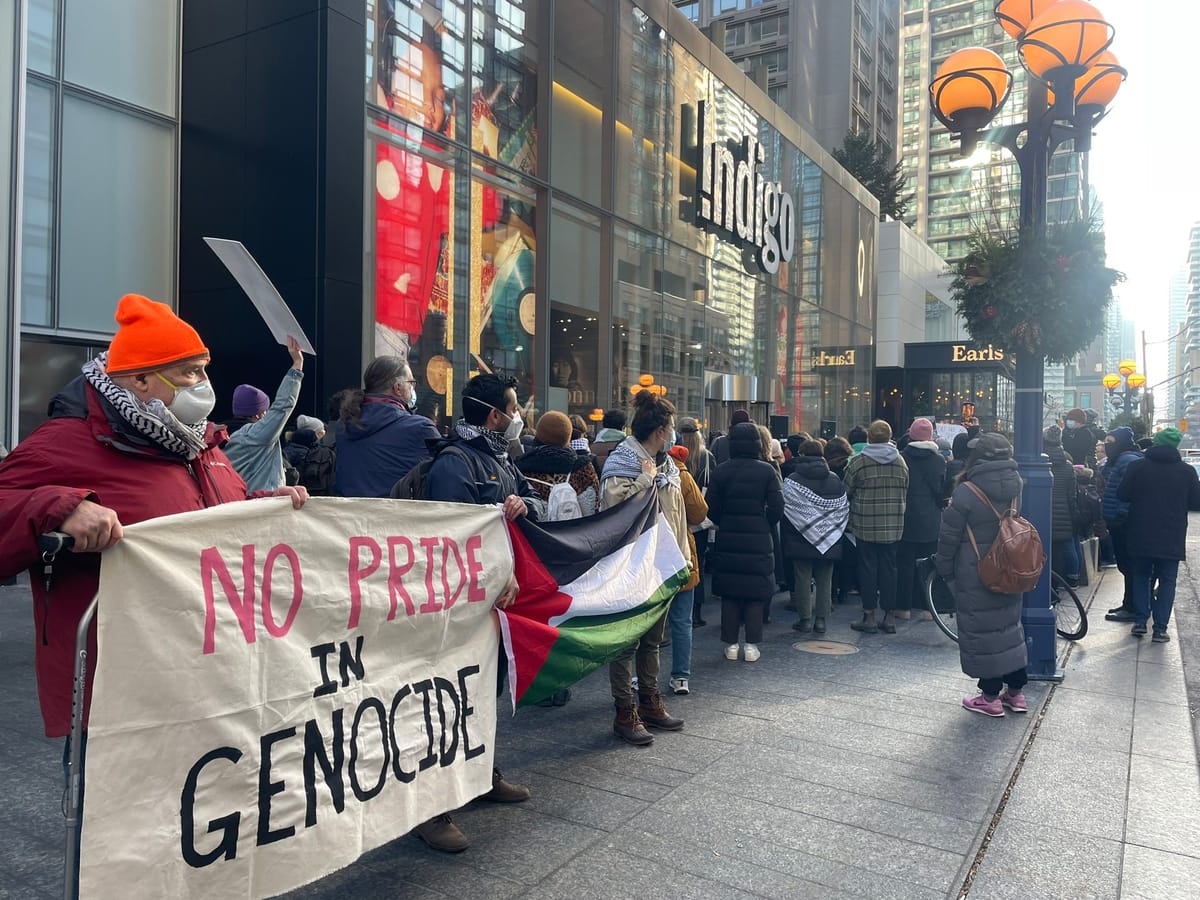
Their hesitance to be identified is understandable. Facing criminal charges brings terrifying risks to one’s employment, housing and other aspects of life. Yet perhaps the scariest consequence is the idea that the protester has done something ‘wrong’ at a time when those in charge — such as political leaders, employers and authorities in health and education — are supporting and funding genocide, while also suppressing dissent. Meanwhile, mainstream media is shamefully unbalanced, and has deliberately misled the public to vilify peaceful protests.
Whatever one’s opinion on methods of protest, people facing charges for Palestine activism are conscientious objectors to perhaps the worst thing the Canadian government has supported in a generation.
Those standing up for Gaza have been criminalized and falsely accused of antisemitism, all to manufacture consent for Israeli occupation, apartheid, and genocide. But those of us protesting war crimes aren’t criminals.
Throughout the course of this year we’ll see many activists being processed in the court system. Prosecutors should drop all charges against them.



